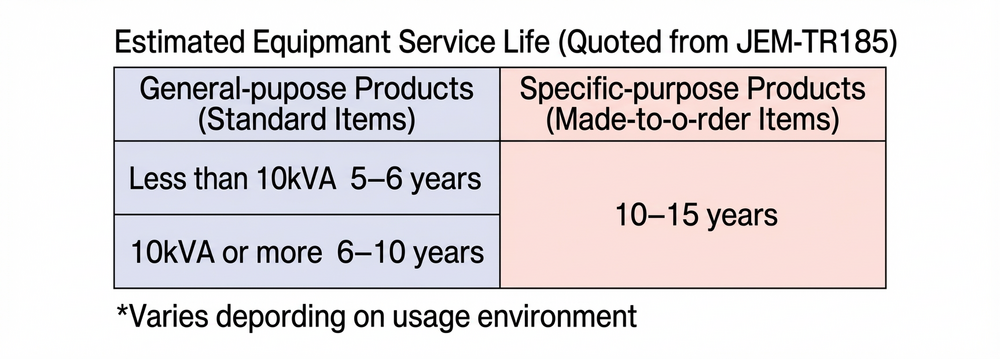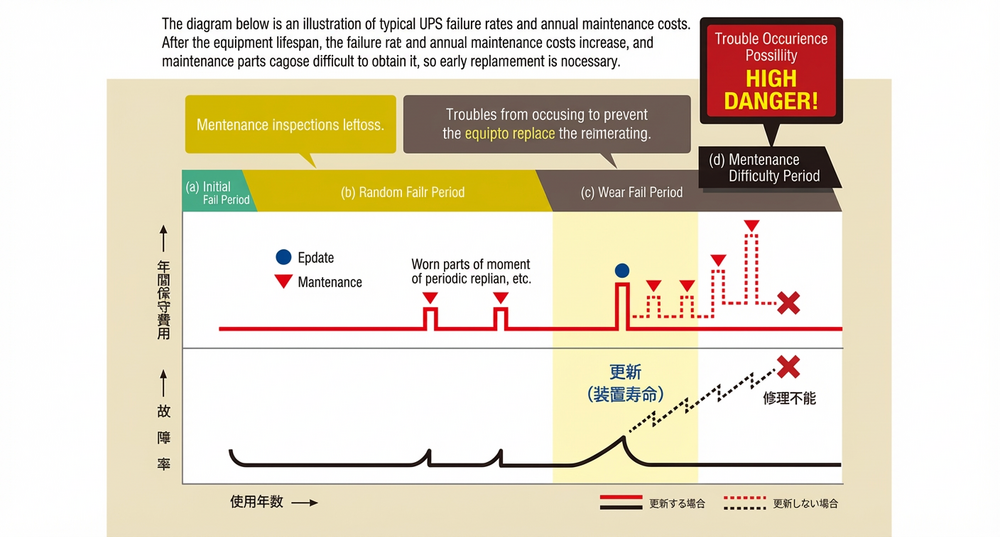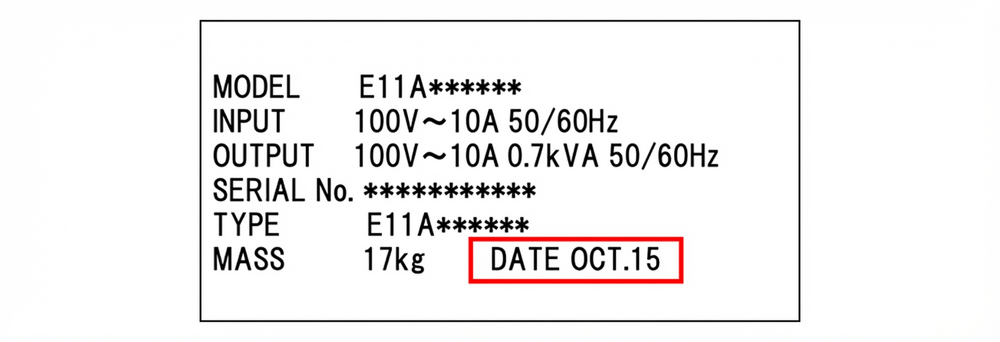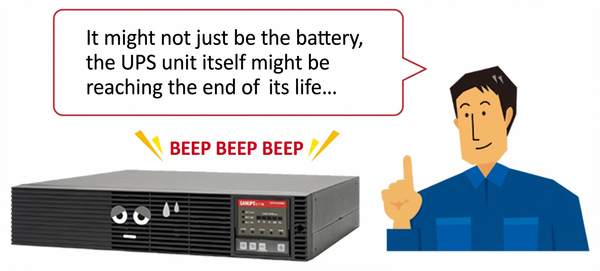



-
- Free Word Search




As you know, UPS is a device that provides a stable power supply in the unlikely event of a power outage or power trouble, acting as an "insurance." Because of its nature, it is often placed in a corner of a factory or office and goes unnoticed.
Even UPSs, which are so easily overlooked for maintenance, have a lifespan, and if you ignore this and continue to use them, unexpected problems and accidents can occur.
In this article, we will introduce you to the lifespan of a UPS, how to determine it, and the benefits of replacing it.
Although it depends on the environment in which the UPS is used, it is generally said to last between 5 and 15 years. This also varies depending on the size, so please see the table below for details.
According to the Japan Electrical Manufacturers' Association (JEMA), the service life is 5 to 6 years for units under 10kVA, and 6 to 10 years for units over 10kVA.

Source: Japan Electrical Manufacturers' Association "UPS (Uninterruptible Power Supplies) User's Guideline / General-purpose UPS User's Guideline"
At first glance, a UPS that has exceeded its lifespan may not appear to have any problems. So, what problems could arise if you continue to use a UPS that has exceeded its lifespan?
Naturally, when a UPS exceeds its lifespan, the risk of failure increases. If the UPS breaks down, it will no longer be able to provide backup power in the event of a power outage or other power problem, and will no longer be able to fulfill its intended role as insurance.
You want to avoid the situation where the UPS you have installed not only proves to be useless in an emergency, but also continues to waste electricity.
Since you have already invested in a UPS, some people may think, "I would like to use it for a long time and repair it at the same time," but this is not a good idea.
As shown in the figure below, the failure rate of a UPS that has exceeded its lifespan increases, and as the failure rate increases, so does the maintenance cost. Not only that, after a certain period of time, maintenance parts become unavailable and repairs become impossible.
Even if you want to use your UPS for a long time, we recommend that you protect the device's lifespan and replace it with a new one.

*Source: Japan Electrical Manufacturers' Association "Plan your UPS maintenance and upgrades"
So how can you tell if your UPS has exceeded its lifespan? There are two main points to consider:
The manufacturing date may be written on the "rating plate" attached to the UPS body. The way it is written varies depending on the manufacturer, but if the date is written as shown in the figure below, you can check the elapsed years from there.
As mentioned above, the general lifespan of a UPS is 5 to 15 years, so you can estimate the end of its life to some extent from this. The official lifespan of the device can be confirmed from the model number.
▼ Image of rating plate
If your UPS is set to sound an alarm when the battery life is reached, when the alarm sounds we recommend that you check not only the battery life but also whether the equipment life has been reached.
The battery life of typical lead-acid batteries is often 2 to 5 years. *1 On the other hand, the life of a UPS unit is 5 to 15 years, so if a battery replacement alarm goes off after you have replaced the battery once or twice, it is possible that the equipment has reached the end of its life.
When replacing the batteries, be sure to check the lifespan of the UPS itself.

*1 Varies depending on usage environment and ambient temperature
If you are going to buy a new UPS, it would be nice if it had some functional benefits as well. Below, we will introduce three UPS functions that have evolved in recent years.
The battery life of a UPS is "2 to 5 years" for conventional lead-acid batteries, but lithium-ion batteries have a long life of "10 years" *1. Not only does the longer life reduce maintenance costs, but it also has many other benefits, such as a smaller UPS and less capacity loss due to aging.
Details page: A thorough comparison of UPS lithium-ion batteries and lead-acid batteries!
By installing a "LAN Interface Card (LAN card)" in the UPS and connecting it to the network in the factory, it is now possible to monitor and control multiple UPSs at the same time. Also, if you use a LAN card that supports Modbus communication, and the factory already has "IoT devices using Modbus communication" such as PLCs, you can easily connect the UPS to peripheral devices and monitor them all at once, contributing to the IoT and visualization of the factory.
It also comes with a wide range of features that further enhance the reliability of UPS as an insurance provider.
For example, in the "parallel redundancy system," by connecting two or more UPS units with parallel operation function in parallel, power can be continued from the other UPS units even if a UPS unit breaks down, compared to the normal single-unit operation of a single UPS unit. This function can provide added peace of mind, especially for factories in areas with unstable power conditions.
How should I dispose of a UPS that I no longer need after replacing it?
At Sanyo SANYO DENKI, when you purchase a new UPS from our company, we will take back any UPS that you no longer need, regardless of the manufacturer. *2 Please apply to your place of purchase at the time of purchase or within 3 months of purchase.
*2 The UPS eligible for collection will be up to the same capacity as each newly purchased product.
Depending on the capacity of the UPS, some models may not be collected free of charge.
SANYO DENKI 's UPS lineup is a long-life product with a life expectancy of 7 to 15 years, depending on the usage environment. *3 It has a longer life than a typical UPS, so it is highly recommended for those who want to use it for a long time since they have made a purchase.
*3 Products currently on sale as of January 2023
This document summarizes the information and overview required when selecting a UPS.
Please download it and use it!
The electronic parts factory where Mr. S works has installed UPS to back up inspection equipment. Although he is aware of the need for daily maintenance, the UPS is a modest, inconspicuous device in the factory, so he has been putting it off.
"It should be fine as I replace the battery when the alarm goes off," I thought, but before I knew it, more than 10 years had passed.
One summer, the area where Mr. S's factory is located experienced unprecedented heavy rains. Finally, on the day when lightning struck near Mr. S's factory, the incident occurred.
"We never imagined that the UPS, which we had installed as a precaution, would stop working. We didn't have a backup for the inspection equipment, so we couldn't maintain traceability, and it took a huge amount of time and money to restore it and have to redo the inspections in the meantime," Mr. S continued, looking back on that time.
"When I looked at the rating plate of the UPS, I realized that it was a 12-year-old product. I understood that UPSs have a lifespan, but I don't know why I didn't maintain it more thoroughly or replace it. I really regret that I had put it off due to my busy schedule and budget."
Mr. S had properly replaced the battery. If he had properly checked the lifespan of the device when the battery replacement alarm sounded, this accident may have been prevented.
This document summarizes the information and overview required when selecting a UPS.
Please download it and use it!
Supervisor: Dr. Kiyotaka Izumiya, Senior Technical Advisor, Sales Department SANYO DENKI CO., LTD.
Update date: /release date: